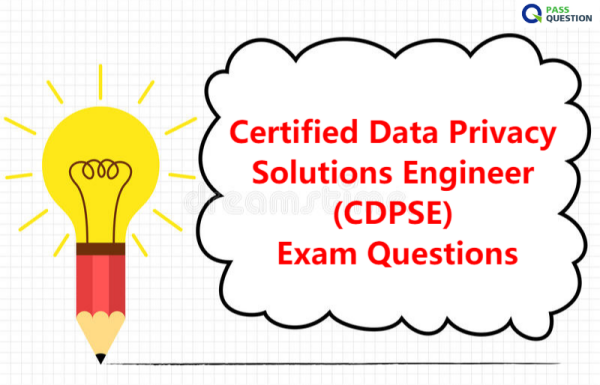Certified Data Privacy Solutions Engineer (CDPSE) Exam Questions
Certified Data Privacy Solutions Engineer (CDPSE) Exam is a popular ISACA Certification Test, if you are going to appear for this CDPSE Certification exam,you can choose PassQuestion valid Certified Data Privacy Solutions Engineer (CDPSE) Exam Questions which are designed according to the requirements of the candidates so you can pass Isaca CDPSE exam on the first try. Certified Data Privacy Solutions Engineer (CDPSE) Exam Questions are designed to follow the pattern of real exam questions. This will allow you feel as if you are in a real exam as it will improve your confidence and decrease stress for you to perform well in actual exams. Make sure that you are using up to date Certified Data Privacy Solutions Engineer (CDPSE) Exam Questions so you can easily clear the Certified Data Privacy Solutions Engineer exam on the first shot.

Certified Data Privacy Solutions Engineer (CDPSE) Certification
The Certified Data Privacy Solutions Engineer (CDPSE) certification is the first experience-based, technical certification of its kind, assessing a technology professional’s ability to implement privacy by design to enable organizations to enhance privacy technology platforms and products that provide benefits to consumers, build trust and advance data privacy.
Certified Data Privacy Solutions Engineer (CDPSE) is focused on validating the technical skills and knowledge it takes to assess, build and implement a comprehensive privacy solutions. CDPSE holders can fill the technical privacy skills gap so that your organization has competent privacy technologists to build and implement solutions that mitigate risk and enhance efficiency.
Exam Details
Exam Name: ISACA Certified Data Privacy Solutions Engineer (CDPSE)
Exam Code: CDPSE
Exam Price ISACA Member: $575 (USD)
Exam Price ISACA Non-member: $760 (USD)
Duration: 210 mins
Number of Questions: 120
Passing Score: 450 / 800
CDPSE Exam Content
Domain 1: Privacy governance: 34%
Domain 2: Privacy architecture: 36%
Domain 3: Data lifecycle: 30%
View Online Certified Data Privacy Solutions Engineer (CDPSE) Free Questions
A migration of personal data involving a data source with outdated documentation has been approved by senior management. Which of the following should be done NEXT?
A.Review data flow post migration.
B.Ensure appropriate data classification.
C.Engage an external auditor to review the source data.
D.Check the documentation version history for anomalies.
Answer : A
Which of the following is MOST important when designing application programming interfaces (APIs) that enable mobile device applications to access personal data?
A.The user's ability to select, filter, and transform data before it is shared
B.Umbrella consent for multiple applications by the same developer
C.User consent to share personal data
D.Unlimited retention of personal data by third parties
Answer : C
An organization has a policy requiring the encryption of personal data if transmitted through email. Which of the following is the BEST control to ensure the effectiveness of this policy?
A.Provide periodic user awareness training on data encryption.
B.Implement a data loss prevention (DLP) tool.
C.Conduct regular control self-assessments (CSAs).
D.Enforce annual attestation to policy compliance.
Answer : B
An organization wants to ensure that endpoints are protected in line with the privacy policy. Which of the following should be the FIRST consideration?
A.Detecting malicious access through endpoints
B.Implementing network traffic filtering on endpoint devices
C.Managing remote access and control
D.Hardening the operating systems of endpoint devices
Answer : B
Which of the following is the PRIMARY objective of privacy incident response?
A.To ensure data subjects impacted by privacy incidents are notified.
B.To reduce privacy risk to the lowest possible level
C.To mitigate the impact of privacy incidents
D.To optimize the costs associated with privacy incidents
Answer : C
Which of the following is the best way to reduce the risk of compromised credentials when an organization allows employees to have remote access?
A.Enable whole disk encryption on remote devices.
B.Purchase an endpoint detection and response (EDR) tool.
C.Implement multi-factor authentication.
D.Deploy single sign-on with complex password requirements.
Answer : C
Comments
Post a Comment